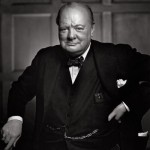Winston Churchill has been on my mind lately, for a funny reason I’ll explain at the end of this post. The Prime Minister of Great Britain during World War II, Winston Churchill, is widely regarded as the most important leader of the past hundred years, if not ever. He galvanized his nation against a dreadful military onslaught and forged an effective global coalition that eventually defeated the most villainous regime in history.
Even to this day, there is a magnetism to Churchill as a leader, an intellectual, and a personality. He brought many tools to bear in his career: intelligence, bravery, curiosity, and insight to name a few. But he is most well-known and loved for skills as a communicator. As both a writer and orator, Churchill captivated those who heard his words. President Kennedy, another gifted speaker, said of him, “He mobilized the English language and sent it into battle.”
Considering his resume, it seems undeniable that the wisdom of such a person would be valuable in this age, in any age. So when Mr. Churchill became an unlikely topic of discussion a few weeks ago, I thought some of his speeches and quotes would make for inspiring bedtime reading. Among my subsequent impressions is how successful Churchill might have been in today’s business world as an executive, a project manager, or even (god help us) a trainer. Here are just a few examples of what I mean:
~~~~~~~~~~~~~~~~
“Like other systems in decay, the Roman Empire continued to function for several generations after its vitality was sapped.”
Churchill studied history and keenly applied it to modern politics. But here he also functions as a systems analyst, I believe. He makes a distinction between the appearance of baseline functionality and viable effectiveness in the future. As a project sponsor, he makes a strong argument for proactive change management. It occurs to me that Churchill would see the importance of us moving to Epic. Like Rome, we could stumble along as is, getting by with the status quo. But to thrive well into the future, systems must evolve.
~~~~~~~~~~~~~~~~
“The dangers we face are still enormous, but so are our advantages and resources. I recount them because the people have a right to know that there are solid grounds for the confidence which we feel, and that we have good reason to believe ourselves capable, as I said in a very dark hour two months ago, of continuing the war ‘if necessary alone, if necessary for years’.”
I don’t have a PMP, but I think Churchill could be a project manager. Here, he describes to his stakeholders the current project state and sets a timeline. With determined confidence, he conveys a realistic appraisal of the situation. Engaged in resource management, he knows full well that he needs more than what he has. But still Churchill knows he must make the best of the resources available.
~~~~~~~~~~~~~~~~
“The era of procrastination, of half-measures, of soothing and baffling expedients, of delays, is coming to its close. In its place we are entering a period of consequences.“
Again as a project manager, Churchill sees the world situation realistically, for what it is, urging action forward. He knows that appeasement and inactivity for the sake of comfort has a dire cost. Project progress must take precedent above all such comforts to avoid negative consequences. He shares this vision with his stakeholders in a commanding yet eloquent way.
~~~~~~~~~~~~~~~~
“Of this I am quite sure, that if we open a quarrel between the past and the present, we shall find that we have lost the future.”
Churchill keeps the project team and stakeholders focused on the tasks that lie ahead. He effectively squelches anyone inclined to play the blame game for the current problems they have to overcome.
~~~~~~~~~~~~~~~~
“I love learning but I hate being taught.”
I think Churchill could have been a trainer and an excellent one at that. Within his own preferred learning style, he sees education is more than just cramming knowledge into someone’s head.
~~~~~~~~~~~~~~~~
There are many other fascinating pearls of wisdom Churchill has to offer us. This exploration could easily become someone’s doctoral thesis. But for now I will end with this simple 1-liner that I think captures Churchill’s true essence. An editorial ran in May 1945 in The Times of London suggesting that Churchill, having won the war, should now retire gracefully instead of running for reelection in July 1945. In response, Churchill said:
“Mr. Editor, I leave when the pub closes.”
Clearly, Mr. Churchill sees there is more work to be done after go-live. He knows a stabilization period is needed and it’s likely to be every bit as messy as the war. At the very least, Britain needs a Lessons Learned session. And what better place to do Lessons Learned than a British pub.
~~~~~~~~~~~~~~~~
And how did this whole line of thought come about? Two weeks ago, we were walking our pug-dog in the park. An older lady came up to us to say hi to him. She was old enough that she might have been a child during the war. After complimenting Colby on how handsome he looked, she said, “He looks just like Mr. Churchill.” I guess I can see the resemblance:


